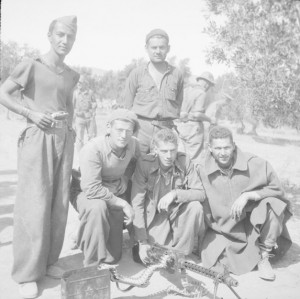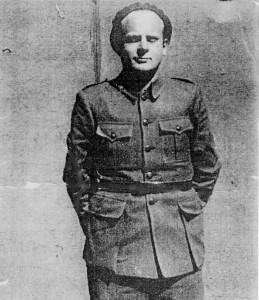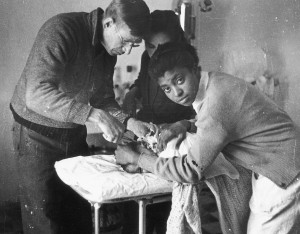Ohio Institute Scores an A
After regular classes ended for 20 Ohio high school teachers last June, they spent another six days on the Oberlin College campus attending the first ALBA Institute in the Midwest. Consisting of nine social studies, nine Spanish, and two English teachers, covering all high school grade levels, the group worked on lesson plans and classroom units—ranging from a couple of days to more than two weeks’ worth—integrating materials related to the Abraham Lincoln Brigade and the Spanish Civil War into their regularly taught curriculum.
The Institute was led by Sebastiaan Faber, taught by Peter N. Carroll, James D. Fernández, and Geoff Pingree, and sponsored by the Puffin Foundation, the Ohio Humanities Council, ALBA, and Oberlin College.
A guiding principle of ALBA’s teacher institutes is that local and global issues are often closely intertwined and that examples close to home can provide a compelling window into the history of the world at large. The Oberlin Institute specifically focused on the effects of the Spanish conflict on life in the state of Ohio, and in particular on five individual Ohioans: Abraham Lincoln Brigade volunteers Carl Geiser, Salaria Kea, David McKelvy-White, and Paul McEachron, as well as Oberlin Spanish professor Paul Rogers. As in ALBA’s other institutes and development days in New York City, Tampa, and the Bay Area, one objective was to help teachers develop units by using primary source material, ranging from letters and diaries to posters, photographs, and film.
The impact of the Spanish Civil War on Ohio is not surprising. The state had been hit hard by the Depression, which in turn had increased social and racial tensions, including friction surrounding the state’s large immigrant population. While Ohio’s centers of industry were strongholds of organized labor, which tended to sympathize with the Spanish Republic, the state also had a large Catholic population, which tended to favor Franco. In early 1937, the pro-Republican documentary Spain in Flames was banned by the Ohio State Board of Censorship, but in December of the same year, the equally pro-Republican film The Spanish Earth was screened at Oberlin’s Apollo Theater as a fundraiser for the Republic.

Oberlin's Paul MacEachron (2nd from left) with NYU volunteers Leonard B. Levenson, Paul Sigel, Emanuel Mandel, and Elkan Wendkos, at Azaila, Spain, October 1937 (Tamiment Library, NYU, 15th IB Photo Collection, Photo #11-0729)
More than 100 Ohioans joined the Abraham Lincoln Brigade. The selected five Ohioans were chosen because their careers were well documented by historical materials and covered a wide range of experiences: Salaria Kea was the only African-American woman to volunteer in Spain; Geiser spent a year in a POW-camp (the topic of his book, Prisoners of the Good Fight); McKelvy-White was from a prominent political family in Ohio; McEachron was a sophomore at Oberlin College, where Rogers taught Spanish—both went over to Spain.
“Teaching these institutes is extremely gratifying,” Peter Carroll said. “The groups are fantastic, and the discussions often quite lively. And we always discover new things. This time, for example, we realized how rich and compelling Carl Geiser’s letters are. His collection includes some real gems.”
The lesson plans that the participants produced will be posted on the ALBA website for use by other high school teachers in Ohio and nationally, and all participating teachers will be supported throughout the year by ALBA as they prepare to teach the topic.















Is that my Uncle Elkan who I am named for? If any surviving ALB members have any recollections of him they would be most welcome. I am in process of producing a doc based on his service during the uprising and what happened to him and why to this day it is a mystery ! Ellos no pasaran! Sincerely Jordan E. Wendkos